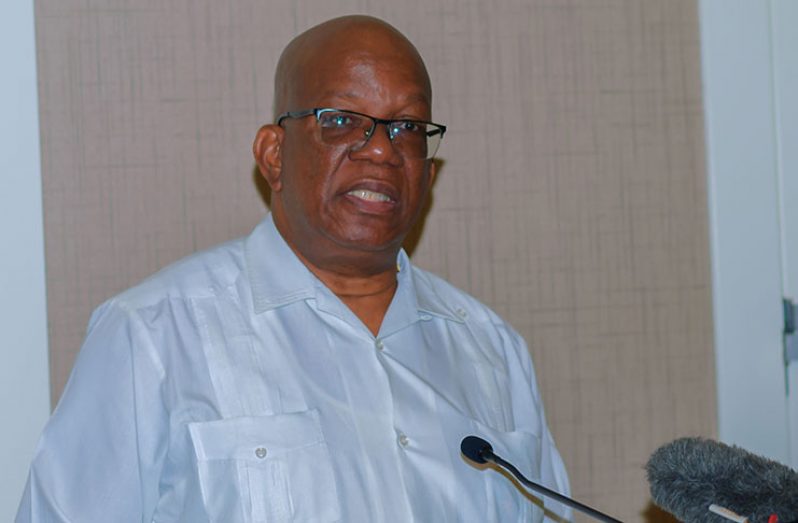–once PSIP gets going, finance minister says
FINANCE Minister Winston Jordan on Monday said every effort is being made to kick-start the economy by getting the Public Sector Investment Programme (PSIP) going.
He told reporters gathered at his Main Street office that though there has been much sloth in the implementation of the PSIP, once they get going, there would be more spending.
Back in June, the minister had disclosed that less than 30 per cent of the $58B budgeted for the PSIP was expended as of that month. “We still have budget agencies, in June, figuring out specifications of items to be purchased; we have awarded only 53 per cent of the PSIP, and expended a mere 28 per cent on maintenance of infrastructure within the recurrent budget,” Minister Jordan had said, his annoyance very much apparent.
Noting that he saw no earthly reason for the continued sloth in the implementation of the PSIP, the minister said agencies can no longer make the excuse of having to work with a late budget.
“No late budget excuse is applicable any longer, because for Budget 2017, the presentation to Parliament was on November 28, 2016, a signal accomplishment of this administration,” he said.
When asked on Monday to correlate economic growth and what appears to be a lack of spending across the country, Minister Jordan explained that on the contrary, the Private Sector’s credit grew during the first half of the year in comparison with the same period last year.
In fact, according to the mid-year report, the net domestic credit grew by 9.1 per cent, on average, from the first half of 2016 due to the change in the government’s net position, with growth in private sector lending only growing, on average, by 2.0 per cent from the first half of last year.
Growth in mortgage lending increased, on average, by 4.5 per cent compared to the first half of the year in 2016. Lending also grew on average by 7.4 per cent in the services sector during the first six months in 2017 compared to the corresponding period last year.
Despite this, those gains were offset by reductions in lending in the agriculture, manufacturing and mining and quarry sectors. Notwithstanding the high liquidity in the banking system, the high level of non-performing loans combined with apparent risk aversion continues to hamper bank lending.
Jordan told reporters that evidence suggests that there has been an increase in the private sector credit, though marginal. “At least, it did not decline, which means people are still spending,” he said, adding:
“People adjust their spending based on their outlook. I think if people become more confident that it is not a one-off growth, they might be inclined to spend even more. Don’t forget, spending in Guyana must have been a direct correlation between performance of the agricultural sector, in particular rice and sugar, and spending in the economy.”
He explained that the number of people employed directly and indirectly in the rice and sugar industries must be examined closely; and that while gold is doing exceptionally well, it is a “capital-intensive industry” that does not employ the amount of labour like the rice and sugar industries, so money is most evenly distributed in the agricultural sector rather than the mining sector.
“It would mean they have more spending power. The whole key to this is to revitalize the agriculture sector,” he said, noting that that sector is made up of small and or medium-sized units.
“It is made up of a massive player called GUYSUCO and a not-so-massive but fairly large player called rice. All the rest are just small units,” he said.
“This massive sector called GUYSUCO doesn’t have the capacity at the moment to play the role it used to play a decade ago,” the Minister added.
GUYSUCO’s employment cost, the Minister revealed, is more than the entity’s earnings, and that without a government bailout, the entity would crumble.
“And the bailout that we are doing is just a pat on the surface, so to speak,” he said, adding:
“GUYSUCO’s deficit continues to ripen. When you ask the question, you have to look at the nature of the economy essentially. You could pay how much wages you want in the public sector, it will not resonate relative to what GUYSUCO and the agricultural sector can do, or the part they played previously.”
But the good news, he said, is that spending is occurring, and in the interim, kick-starting the PSIP, along with the housing sector programme, will see a dramatic change in spending.



.jpg)









